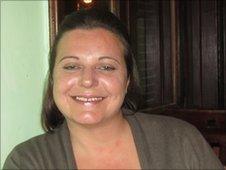Weapons and vigilantes under Cairo curfew
- Published

Joy Baddiley, who lives in Cairo, carried a fire poker to walk the dog
"Everybody picked up arms, made their homemade weapons and took to the streets."
Joy Baddiley lives in Cairo. She moved from Nottinghamshire to teach at an international school and found herself in the centre of a revolution and part of what she calls a "civilian watch group".
A revolution that saw a President flee in Tunisia reached Egypt in January. Protests began with a "day of rage" on 25 January and continued for 18 days until President Mubarak stepped down.
On the third day, a curfew was imposed across the capital, Cairo, forbidding people to be out on the streets between midnight and 6am.
It was shortened this week (28 March) to three hours beginning at 2am.
Home-made weapons
Joy lives in Maadi, a wealthy suburb of Cairo and home to many expats.
It also housed a prison. In the chaos of the protests, hundreds of prisoners escaped. With no police on the streets, the people guarded their homes and properties.
"On the end of every street corner there'd be a group of at least five or ten people just waiting for what was coming," says Joy.
She carried a fire poker to walk the dog.
"Because everybody else had a weapon, you just felt like you needed one," she said. "We saw some incredible weapons, most of them homemade. Sticks with knives tied to the ends, blades, daggers."
Her friend Mark Barratt-Gibson is from Burton-on-Trent and works at the same school in Maadi.
House parties
Cairo under curfew is a very strange place, he says, describing how he saw someone walking down the street carrying a bow and arrow.
"There were just huge groups of guys armed with sticks standing at the end of every road," he recalls.
Anyone out after curfew was told to go home because it wasn't safe.

Mark evacuated to Sharm el-Sheikh
"I could see that," Mark laughs. The curfew has had the biggest impact on these Brits living in a city that once never slept.
"There's more house parties and fewer clubs and boat parties," he says. "But you can also see the effect it's had on other people."
When the protests first started, Joy and Mark stayed with friends in Zamalek, another area in Cairo closer to Tahrir Square where the demonstrations were happening.
They joined Egyptian friends on the march.
Dicey feeling
"I have got so many Egyptian friends," says Joy who has been living between Cairo and the UK since she was aged 17.
"I understand their cause of trying to get rid of a regime which I've seen and witnessed as being so harsh and so long."
But when camels were released on demonstrators in Tahrir Square by the struggling regime, Joy thought it was time to stay away.
"It got a bit frightening," she says, particularly when state media started reporting that foreigners were behind the protests.
"A lot of Egyptians seemed to believe that and the next morning there was a very dicey feeling".
She and her friends joined other foreigners who evacuated themselves to Sharm el-Sheikh. She even returned to England for five days.
Joy and Mark have both now returned to Cairo and plan to stay.
"They were just really nice people from all walks of life trying to protect the streets whilst the prisoners were out and everybody else was protesting in Tahrir Square," says Joy of the vigilantes.
"But it's not life as normal," Mark says.